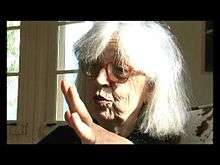Carole Roussopoulos
| Carole Roussopoulos | |
|---|---|
 | |
| Born |
Carole de Kalbermatten 25 May 1945 Lausanne, Switzerland |
| Died | 22 October 2009 (aged 64) |
| Spouse(s) | Paul Roussopoulos |
Carole Roussopoulos (25 May 1945 – 22 October 2009) was a Swiss film director and feminist who was primarily known for her pioneering early documentary films of the Women's liberation movement in France. She made approximately 150 documentaries during the course of her career.[1]
Early life
Carole de Kalbermatten was born 25 May 1945 in Lausanne, Switzerland.[2] She grew up in Sion, Switzerland in the canton of Valais.[2]
Career
In 1969 Roussopoulos and her husband, Paul, created a film collective called Video Out.[3] In 1970, at the urging of her friend the author Jean Genet, she purchased a light-weight Sony Portapak camera and began to make documentaries.[2] That same year she made the documentary film Genet parle d'Angela Davis (known in English as Angela Davis Is at Your Mercy) about the American political activist Angela Davis.[2] During her early career, Roussopoulos also witnessed and filmed key events in the human rights crusades in Paris. For instance, her 1971 film FHAR (Front Homosexuel d'Action Révolutionnaire) documents the very first gay rights parade in Paris.[2]
In 1976 Roussopoulos began collaborating with the French actress Delphine Seyrig. Together they directed the 1976 documentary on women's rights entitled SCUM Manifesto, based on the SCUM Manifesto written by the radical feminist Valerie Solanas.[2] In 1982, Roussopoulos, Seyrig and Ioana Wieder founded the Simone de Beauvoir Audiovisual Center—named after the prominent French feminist author and philosopher—to document the women's rights movement.[4]
In 1995 she moved back to Switzerland to document Swiss subjects that she felt were not receiving enough attention.[2] During this time she made a series of films about healthcare, disease, aging, and death.[2]
Select filmography
- SCUM Manifesto (1976)[5]
- Debout! Une histoire du mouvement de libération des femmes (1999)[6]
- Cinquantenaire du deuxième sexe: 1949-1999 (2001)[7]
Death
Roussopoulos died on 22 October 2009 in Molignon, Switzerland.[8]
Recognition
In 2001 Roussopoulos was named a Knight (or Chevalier) of the Legion of Honor in France for her thirty-two years of service to film.[9]
Legacy
In 2011 the Swiss filmmaker Emmanuelle de Riedmatten made a documentary about Roussopoulos's life called Carole Roussoupolos, une femme à la caméra.[10]
Reference list
- ↑ "Caméra au poing !". Association Carole Roussopoulos. Retrieved August 11, 2014.
- 1 2 3 4 5 6 7 8 Fernandez Ferrer, Nicole. "Carole Roussopolous: Biography" Archived July 14, 2014, at the Wayback Machine., New Media Art, Retrieved 11 July 2014.
- ↑ Palmer, Tim and Mitchell, Charlie. "Carole Roussoplous", Directory of World Cinema: France, ISBN 978-1-84150-563-3, pg.107.
- ↑ "Who are We?", Centre Simone de Beauvoir, Retrieved 11 July 2014.
- ↑ "Scum Manifesto", Internet Movie Database (Imdb), Retrieved 11 July 2014.
- ↑ "Debout! Une histoire du mouvement de libération des femmes", Internet Movie Database (Imdb), Retrieved 11 July 2014.
- ↑ "Cinquantenaire du deuxième sexe: 1949-1999", Internet Movie Database (Imdb), Retrieved 11 July 2014.
- ↑ Sentin, Marine. "La morte de Carole Roussoupoulos", Mediapart, Retrieved 11 July 2014.
- ↑ "Décret du 11 avril 2001 portant promotion et nomination", Legifrance, Retrieved 11 July 2014.
- ↑ "Carole Roussopoulos, une femme à la caméra", Swiss Films, Retrieved 11 July 2014.